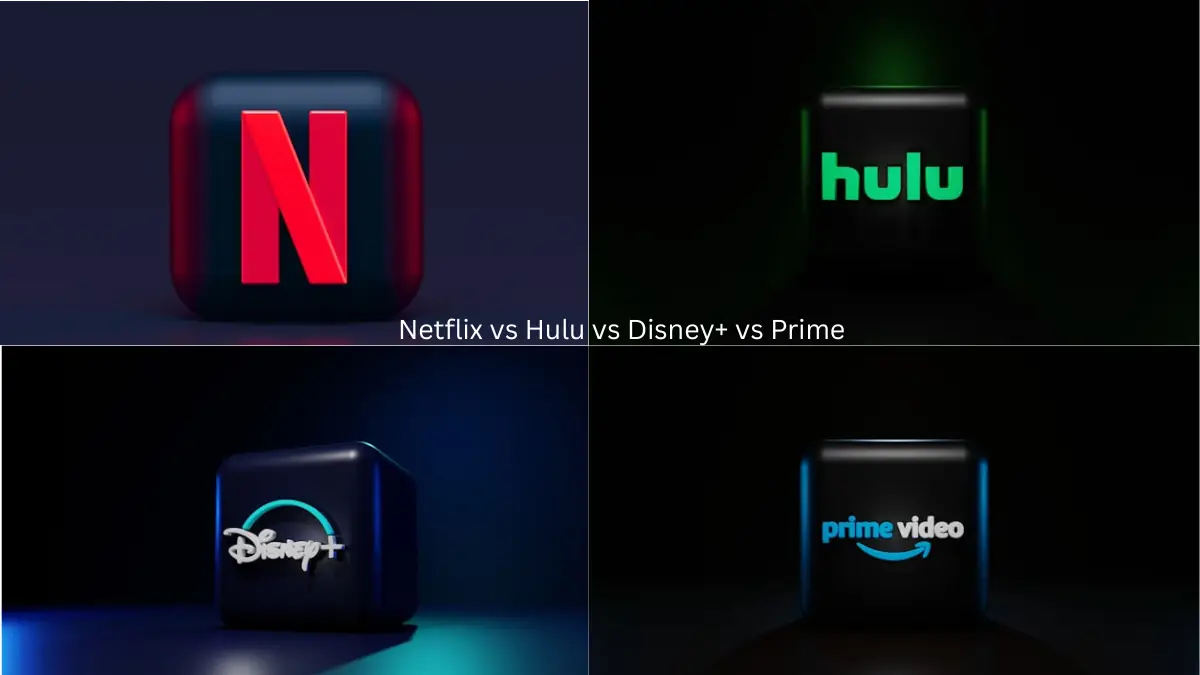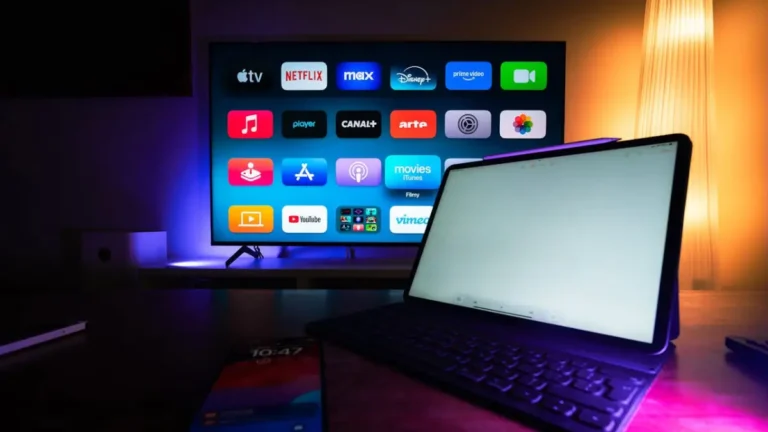Choosing between streaming services isn’t getting easier. This Netflix vs Hulu vs Disney+ vs Prime comparison breaks down pricing, content libraries, and user experience to help you pick the right platform. With Americans spending $42.38 monthly on streaming, making smart choices matters.
Market Position and Subscriber Base
Netflix: The Streaming Leader
Netflix dominates with 301.6 million global subscribers and 21-22% US market share. The platform added 18.9 million subscribers in Q4 2024, proving continued growth despite competition.
Amazon Prime Video: The Close Competitor
Prime Video captures 22% of US market share with 220 million Prime subscribers worldwide. The service benefits from Amazon’s broader membership program.
Disney+: The Family Favorite
Disney+ maintains 124.6 million global subscribers with 12% US market share, focusing on premium family content and franchises.
Hulu: The US Specialist
Hulu serves 53.6 million paid subscribers with 10-11% US market share, specializing in next-day TV content.
Pricing Comparison
Netflix Pricing (2025)
- Standard with Ads: $7.99/month (increased from $6.99)
- Standard (Ad-free): $17.99/month (increased from $15.49)
- Premium (4K): $24.99/month (increased from $22.99)
Netflix operates the most expensive pricing structure among major platforms.
Hulu Pricing
- Ad-supported: $9.99/month
- Ad-free: $18.99/month
- Bundle options: Significant value with Disney+ and ESPN+
Disney+ Pricing
- Basic (with ads): $10/month (increased from $8)
- Premium (ad-free): $16/month (increased from $14)
- Annual Premium: $139.99/year
Amazon Prime Video Pricing
- Standalone: $8.99/month (video only)
- Prime membership: Includes video with shipping benefits
- Ad-free add-on: Additional cost in some regions
Content Library Analysis
Netflix Content Library
Netflix offers 3,800 movies and 1,800 TV shows in the US. The platform invested $18 billion on content in 2024, with Netflix Originals comprising 25% of the library.
Notable originals: Stranger Things, Wednesday, Squid Game, Bridgerton
Amazon Prime Video Content
Prime Video maintains the largest library, dwarfing competitor collections with 20,000 movies and 2,700 TV shows. Amazon increased content spending to $18.9 billion in 2023.
Notable originals: The Boys, The Marvelous Mrs. Maisel, The Lord of the Rings: The Rings of Power
Hulu Content Library
Hulu features 1,200 movies and 1,300 TV shows, focusing on next-day TV content and acclaimed originals.
Notable originals: The Bear, The Handmaid’s Tale, Shōgun, Only Murders in the Building
Disney+ Content Library
Disney+ operates with 1,300 movies and 500 TV shows, focusing on quality over quantity with content from Disney, Pixar, Marvel, Star Wars, and National Geographic.
Notable content: The Mandalorian, Marvel series, Disney classics
User Experience and Interface
Netflix Interface
Netflix leads with clean, intuitive design and powerful recommendation algorithms. Features include:
- Personalized content recommendations
- Multiple user profiles
- Offline downloads
- 4K HDR streaming (Premium tier only)
Amazon Prime Video Interface
Prime Video historically struggled with user-friendly design. However, 2022 redesign improvements added:
- X-Ray for cast information
- Audio boost for dialogue
- Mobile zoom capabilities
Hulu Interface
Hulu provides solid user experience with:
- Content filtering by channel
- Customizable subtitles
- Top 15 content lists
- Disney+ content integration
Disney+ Interface
Disney+ offers clean, family-friendly navigation featuring:
- Excellent parental controls
- High-quality 4K streaming
- IMAX enhanced content
- Simple interface for all ages
Device Compatibility and Setup
All four platforms support comprehensive device compatibility across smart TVs, mobile devices, gaming consoles, and streaming devices. However, your setup experience varies significantly by platform.
Smart TV Integration
Most modern smart TVs come with these apps pre-installed. If you’re setting up a new smart TV, our complete guide to turning your TV into a smart TV covers the basics across all major brands.
For specific TV setups:
- Samsung users: Check our Samsung smartphone-to-TV connection guide for seamless streaming
- LG TV owners: Our LG webOS setup guide optimizes your streaming experience
- Sony Bravia users: Follow our Sony Bravia smart TV setup for best performance
Streaming Device Options
If your TV lacks smart features, dedicated streaming devices offer superior performance:
Fire TV Stick: Amazon’s device naturally integrates with Prime Video. Our Fire TV Stick entertainment hub guide maximizes its potential across all streaming platforms.
Roku: Excellent neutral platform for all services. Check our Roku TV setup and optimization guide for quick configuration.
Android TV: Google’s platform offers voice control and app variety. See our Android TV setup guide for complete configuration.
Common Setup Issues
Wi-Fi connectivity problems plague all streaming services. Our smart TV Wi-Fi troubleshooting guide resolves buffering and connection issues across platforms.
App management becomes crucial when juggling multiple services. Our smart TV app management guide helps organize and optimize your streaming apps for better performance.
Video Quality and Performance Comparison
4K and HDR Support
All platforms support 4K Ultra HD, HDR10, and Dolby Vision streaming, but access varies:
Netflix: 4K limited to Premium tier ($24.99/month) with excellent quality delivery
Prime Video: Includes HDR10+ support with comprehensive 4K library
Disney+: 4K included in standard pricing with exceptional quality, especially for Marvel and Star Wars content
Hulu: 4K available but with limited content selection compared to competitors
Streaming Performance
Your viewing experience depends heavily on proper device setup and network configuration. Buffering issues often stem from Wi-Fi problems rather than service quality – our smart TV Wi-Fi troubleshooting guide addresses common connectivity issues across all platforms.
Pros and Cons Summary
Netflix
Pros: Largest content variety, excellent originals, superior recommendation system, global content Cons: Highest pricing, content rotation, limited 4K access
Hulu
Pros: Next-day TV content, quality originals, competitive pricing, Disney bundle value Cons: US-only availability, limited international content, ad-supported focus
Disney+
Pros: Premium family content, franchise exclusives, high production values, affordable bundles Cons: Limited content diversity, narrow target audience, smaller overall library
Amazon Prime Video
Pros: Largest library, Prime membership benefits, diverse content, competitive pricing Cons: Confusing interface, mixed free/paid content, inconsistent quality
Disney Bundle Packages
Disney offers the most compelling bundle value:
- Disney+ & Hulu Basic: $10.99/month (with ads)
- Disney+ & Hulu Premium: $19.99/month (ad-free)
- Disney+, Hulu & ESPN+ Basic: $16.99/month (with ads)
- Disney+, Hulu & ESPN+ Premium: $26.99/month (mostly ad-free)
These bundles provide exceptional value compared to individual subscriptions.
Which Service to Choose
Choose Netflix if: You want the largest content variety, superior original programming, and premium user experience.
Choose Hulu if: You prioritize current TV content, quality originals, and value through Disney bundles.
Choose Disney+ if: You have family viewing needs, love franchise content, and want premium production quality.
Choose Amazon Prime Video if: You’re already a Prime member, want the largest library, and can tolerate interface limitations.
Conclusion
This Netflix vs Hulu vs Disney+ vs Prime comparison shows each platform serves different needs. Consumer behavior shows people spending less on streaming while practicing “churning” between services.
For maximum value, consider Disney bundle packages providing multiple services at competitive pricing. Most users find satisfaction with 1-2 primary services rather than maintaining all four simultaneously.
The key is matching your viewing habits and budget to the right platform’s strengths.




